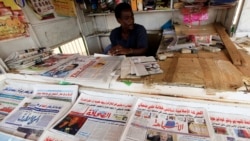Newspapers in the East African country have been battered by years of political censorship and economic hardship. Now, citizens mainly get their news online, sometimes from online papers, but also through social media, where rumors and disinformation are rife.
"Print journalism is facing existential challenges," said Mohamed Abdelaziz, secretary general of the Sudanese Journalists Syndicate, a union re-established last year.
Abdelaziz said there was a sharp decline both in the number of papers still publishing, and in the quantity they print, which was down by as much as 90%.
As a result, Abdelaziz said, many print journalists have left the industry or been laid off.
Sudan has been in political and economic turmoil for years, witnessing a mass uprising and two coups in the past four years.
Sudanese citizens have seen the value of their currency plummet in recent years as costs for fuel and every day goods skyrocketed amid economic reforms that had aimed to re-open the country's economy to financing and investment. A coup in October 2021 put a stop to new flows, accelerating the decline.
A newspaper in Sudan costs about 300 Sudanese pounds ($0.53), compared with the vast amount of news and information available for free online.
"I'm in favor of print journalism, and I hope it doesn't die, because our society needs the credibility it offers," said Youssef Hamad, editor in chief of Al-Hadatha, a paper that started out in print and now publishes online for both political and economic reasons. Hamad added that distribution of newspapers outside the capital Khartoum is becoming scarce.
Abdel Qader Himmat, one of few citizens who still buys print, said newspapers are more important than any other medium because they could be tangibly preserved.
"Any article (online) can be deleted, but print journalism is a main pillar of history and information," he said at a bookstore in Khartoum.








